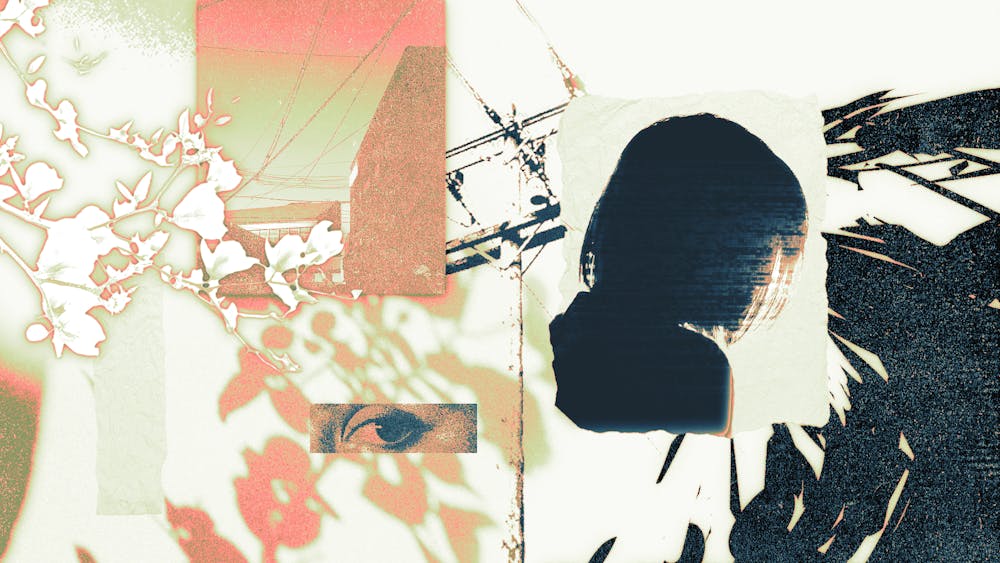Japanese Breakfast's latest album—before the release of For Melancholy Brunettes (& Sad Women) on March 21—was not their widely acclaimed record Jubilee, as some reviews incorrectly cite. In reality, the group released an instrumental Original Video Game Soundtrack for Sable in September 2021 just a few months after the release of Jubilee. The game centered around exploration, and the soundtrack was softly infused with the whimsy and adventure of an open–world landscape.
The preceding albums long–seemed to be at odds; if Sable (OVGS) were a sun shower, Jubilee would be a mighty hurricane. If Sable were a cleanly shattered window pane, Jubilee would be a nuclear explosion. Though both records are powerful and beautiful in their own right, they differ extremely. For three and a half years spent in the same discography, these conflicting records didn’t make sense—that is, until For Melancholy Brunettes (& Sad Women): the exact synthesis of its two predecessors.
For Melancholy Brunettes (& Sad Women) is a series of oxymorons: psychedelic Americana, joyful dread, serene symphony, even “Winter in LA.” Every track is filled with its own collection of contradictions, and these discrepancies result in a cohesive, invigoratingly peaceful listening experience.
Opening track “Here is Someone” launches the album into an instant fusion of genres. The song merges folk–style guitar plucking with exuberant synthesizers, crafting a Folktronica (inherently oxymoronic genre) sound reminiscent of Korean musician Mid–Air Thief. “Here is Someone” is one of the most experimental tracks on the record; the series of synthesized jerks and jolts paired with the calming presence of the acoustic guitar is wholly new and fresh. These conflicting sounds reflect the conflict in the lyrics. Lead vocalist and songwriter Michelle Zauner writes about “quietly dreaming of slower days,” and contrasts this image with her (presumed) lover’s “morning tremors.” The music mirrors Zauner’s strife: a thirsting for calm amidst chaos.
“Orlando in Love,” the record’s lead single, continues the record’s contradictions. The song sits neatly between the quaint sonic environment of the Sable soundtrack, the orchestral grandeur of Jubilee, whilst adding a layer of Zauner’s biting lyricism found in previous records like Soft Sounds from Another Planet. She delves into this notion of an “ideal woman,” and pairs this exploration with dreamy strings and elegant vocal harmonies to craft a clash carried on in the songs to follow.
Sonically, a few tracks lean clearly toward one past record or another. Take “Honey Water,” for instance, a replication of Jubilee’s distinctive sound. The song ignites a contrast between the acoustic guitar’s driving beat and the electric guitar and synthesizer's occasional flourishes, ending with the latter’s eventual taking over, swallowing the sound of the acoustic with its wailing crescendo. Jubilee songs like “Savage Good Boy” and “Posing for Cars” embody a similar juxtaposition, but Zauner’s hushed vocals on “Honey Water” distinguish it from the aforementioned tracks. Though “Honey Water” as a whole sounds massive, the vocals are nearly quiet enough to blend into the background. This sonic polarity mirrors the image of honey water itself: thick, golden nectar stirred into a whirlpool, gradually dissolving, vanishing, while leaving behind a potent sweetness.
“Little Girl” functions as the inverse of “Honey Water." Now, a soft acoustic melody paired with destructive lyrics. Sonically, the track doesn’t stray far from the acoustic guitar, gradually incorporating light percussion, piano, and additional strings. Like “Honey Water,” Zauner’s vocals are quiet, but this time, they aren’t contrasted with an eclectic musical backdrop. Instead, the somber sound conflicts with Zauner’s brutal lyrics. “Little Girl” tells the story of a girl who leaves her alcoholic father and never looks back. The father, devastated by her absence, desperately wants to reconcile with her. He likens his loss and self–destructive tendencies to “everyday immolation” and “annihilation.” The track is deceptively tranquil; though the soundscape is undoubtedly relaxing, the heart–wrenching underlying story gives the track a quiet intensity.
Of course, on an album filled with conflicting sounds and lyrical themes, there are bound to be moments where two contrasting elements don’t quite mesh together. Case in point: “Men in Bars” (feat. Jeff Bridges). The track isn’t horrible–horrible, but it’s definitely the least pleasant moment on the record. The trouble stems largely from Jeff Bridges’ (yes, that Jeff Bridges) strained vocals; he sounds more like a Bob’s Burgers character than the wounded lover he is made out to be. “Men in Bars” tells a story of infidelity. A woman (Zauner) is unfaithful to her partner (Bridges) and the track traces the fallout of their relationship, all through the lens of a country twang. Perhaps Zauner sought a deep, gritty voice to represent this character’s broken heart or even the titular “Men in Bars.” Either way, the voices just don’t quite blend.
In its twists and turns, ups and downs, mixes and matches, For Melancholy Brunettes (& Sad Women) isn’t just for the titular “melancholy brunettes” and “sad women." It’s for everyone. The ever–present calmness of the record creates a sonic ambiance sure to heal any instance of anxiety or sorrow. Though Zauner’s lyrics are rich with turmoil and anger, everything she writes is filtered through the serenity of the production and instrumentation. For Melancholy Brunettes (& Sad Women) is proof that no matter the hardships you undergo, peace and joy are always there. Sometimes, they’re just waiting in the background.
All in all, For Melancholy Brunettes (& Sad Women) fits neatly into Japanese Breakfast’s discography, putting everything that works from their previous records into one universal musical melting pot.

